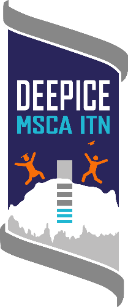A network of international researchers launches a European collaboration this week ( 14 October 2021). This collaboration will train a new generation of scientists to understand how past climate changes impacted Antarctica
 The new European innovative research and training network "DEEPICE" aims to equip the next generation of scientists with a solid background in ice core-related climate science, with a particular focus on Antarctica. It will also tackle major technological and scientific challenges in order to optimally exploit the Beyond EPICA – Oldest Ice Core that will be extracted by a large European team in Antarctica in the coming years, to recover up to 1. 5 million years of climate data. Ultimately, these initiatives will answer key questions about large climate shifts that Earth faced in the past, and their impacts on the Antarctic ice sheet.
The new European innovative research and training network "DEEPICE" aims to equip the next generation of scientists with a solid background in ice core-related climate science, with a particular focus on Antarctica. It will also tackle major technological and scientific challenges in order to optimally exploit the Beyond EPICA – Oldest Ice Core that will be extracted by a large European team in Antarctica in the coming years, to recover up to 1. 5 million years of climate data. Ultimately, these initiatives will answer key questions about large climate shifts that Earth faced in the past, and their impacts on the Antarctic ice sheet.
Climate change in Antarctica may have important consequences for our society, as these may impact future global sea level due to the large volume of fresh water stored in the ice sheet. Hence, on the eve of the next Conference of the Parties (COP26), understanding climate changes and the vulnerability of the Antarctic ice sheet is a priority issue more than it ever has been before. As younger generations will inherit a planet that will look much different to today, they need to receive appropriate information to help them take actions in confronting one of the largest environmental crisis humanity is facing. Not only will DEEPICE prepare a network of young climate scientists, but it will also give them the much-needed skills to efficiently communicate the issue of climate change with the general public.
Through the PhD projects of 15 fellows, the new programme will prepare the tools for optimal use of the very old ice core, developing cutting-edge instrumental techniques, state-of-the-art statistical tools for signal reconstruction and coupled climate models. These outputs will directly contribute to better understanding past processes in the climate system and, thus, improving prognoses for the future. This European network will also offer unique links with many non-academic partners that will provide these young scientists with the extended skill-set now required for pursuing academic and non-academic careers.

Dr Amaëlle Landais is a CNRS research director at the Laboratory for Sciences of Climate and Environment (LSCE) and the lead coordinator of the DEEPICE network. She says:
"Climate change is a major challenge for society today. New generations must be given the best tools to meet this challenge."
Dr Emilie Capron is a CNRS research scientist at the Institute of Environmental Geosciences (IGE) and the co-coordinator of the new research and training network. She says:
"The study of past climate is key to understanding the way our climate system works and how it might change in the future."
Prof. Carlo Barbante from the University of Venice is the Leader of the BE-OI project. He says:
"The quest for Oldest Ice is one of the most intriguing and enigmatic challenges in the field of climate sciences. To tackle it, we need the best young talented scientists."
Dr Louise Sime, a climate change scientist at British Antarctic Survey, who is supervising a new DEEPICE PhD student, says
"It's wonderful to be a part of DEEPICE - it provides the ideal cross European training network for the new exciting generation of climate and ice core scientists."
This EU innovative research and training network features 10 research organisations and universities as well as 10 partners from the academic and non-academic sectors. It began in January 2021 and will continue until December 2024.
Beneficiaries: CNRS (Coordinator), France; Alfred Wegener Institut, Germany; University of Bergen, Norway; University of Bern, Switzerland; Utrecht University, Netherlands; Ca' Foscari University of Venice, Italy; Université Libre de Bruxelles, Belgium; University of Copenhagen, Denmark; University of Lund, Sweden; UK Research and Innovation- British Antarctic Survey, United Kingdom
Partner organisations: TOFWERK AG, Switzerland; Past Global Changes, Switzerland; Schäfter & Kirchhoff GmbH, Germany; University of Milano-Bicocca, Italy; Air Liquide, France; PICARRO, USA; University of Art London - Central Saint Martins, United Kingdom; Teledyne CETAC Technologies, USA; Interscience BVBA, Belgium ; Risk Management Solutions, USA.







